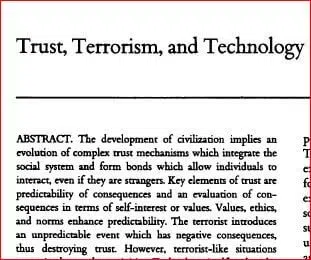
Our previous article concluded with two possible orientations of the virtue of temperance: a self-regarding orientation and an other-regarding orientation. Temperance is generally considered to have the first orientation. It would be an individual or self-regarding virtue, before being a collective or other-regarding virtue. However, there are different ways of arguing that temperance can contribute to the well-being of others and to the general well-being. These are discussed in this article.
1.
Stepping out of the self through temperance
At first glance, temperance is all about the inner life. The idea that anyone who possesses and exercises this virtue does so for their own well-being seems natural. It is enough to state its definition: “Temperance [is] the disposition to restrain and moderate one’s impulsive and inappropriate appetites” (1). If the person who experiences these “impulsive and inappropriate appetites” seeks to restrain them by exercising their virtue of temperance, it is to change their own inner situation, not that of others. Their desires are their own, and although they may, in some cases, receive external help to contain them, this remains fundamentally their own business.
In his description of the psychological functioning of the temperate person (the “moderate man,” see note 2), Aristotle suggests that this virtue operates only for their own good:
“The temperate person occupies a mean position with regard to pleasures. For he does not enjoy the things that the intemperate enjoys most – rather he actually dislikes them – nor, in general, pleasures it would be wrong to enjoy; nor does he enjoy any pleasure to excess; nor does he feel pain or appetite at the absence of pleasures, except perhaps in moderation, and not more than is right, at the wrong time, and so on.” (2)
The following definition, which is in line with the Christian understanding of temperance, emphasises the person’s “regulation” of their own selfish interests. However, it implicitly presents this virtue as the necessary condition for detaching oneself from the tendency of every human being to turn inward – or, to use Iris Murdoch’s expression, to be blinded by self (3):
“Temperance (also called moderation or self-control) seeks to moderate any deficiencies and excesses and thus regulates self-serving interests when making decisions.” (4)
The possibility that temperance can liberate the person, to a certain extent, from the forces of the self, was clearly stated by Pablo Sanz and Joan Fontrodona in the text we commented on in our previous article (5). After noting that, insofar as its function is the control of desires, temperance is “the virtue through which the human being is in true possession of himself,” they consider that the possession and exercise of temperance are necessary conditions for moral development and access to moral goods:
“Temperance becomes a necessary condition (although, of course, not sufficient) to attain all other virtues. In particular, it is commonly held by Ancient Greek philosophers that the absence of temperance restricts the human being from reaching other goods different from pleasure and, therefore, from reaching other moral or intellectual goods.”
2.
Temperance as a cardinal virtue in business life
This is a first step towards broadening the horizon of temperance. In academic business ethics, there are different ways to conceive it.
The philosopher Robert Solomon, who defended an Aristotelian view of business ethics, proposes a more general argument, in the sense that it concerns all virtues (6).
“Almost all of Aristotle’s virtues are recognizable as business virtue”
Because market economic activity is subject to specific constraints and has its own rules, one might think that the virtues of economic agents are also specific. Solomon rejects this idea because it implies a separation between economic activity and other human activities. Instead, he defends the thesis of a continuity that goes as far as a harmony between professional roles and the other roles that each person is called upon to play in the course of his or her life. As a result, he argues, “almost all of Aristotle’s virtues are recognizable as business virtue,” especially since “business is, above all, a social activity, which involves dealing with other people in both stressful and friendly situations.”
Solomon refers to the “moderation” that Aristotle advocated. It is to be understood here as a principle governing the exercise of each of the virtues, as the search for the “golden mean” (7). Solomon applies it to the virtue of generosity. This, according to Aristotle, does not require the person to sacrifice all of their possessions – a step that Solomon carelessly describes as “fanaticism” (8):
“The virtues for Aristotle do not involve radical demands on our behavior, and the sort of fanaticism praised if not preached in many religions (‘give away all of your worldly goods’) is completely foreign to Aristotle’s insistence on ‘moderation.’ Thus the generous or ‘magnificent’ person gives away only as much of wealth as will increase his or her status in the community. Here we would encounter the familiar charge that such giving is not true generosity, for it involves no personal sacrifice and includes a ‘selfish’ motive, the quest for self-aggrandizement. But Aristotle would refuse to recognize this opposition between enlightened self-interest and virtue.”
In an article published in 2005, Geoff Moore addresses more specifically the question of extending the virtue of temperance beyond the sphere of the individual (9). He argues for the possibility that an organisation can be virtuous in the same sense that we say a person is virtuous. His argument is based on Alasdair MacIntyre’s conception of internal and external goods relating to a practice, which Moore calls the “virtues-practice-institution schema” (10).
It is one of the roles of corporations to balance internal goods
(work well done, good work) and external goods (money, reputation)
According to this “schema,” virtues are often exercised within organisations in which trades and practices are deployed. These organisations are supposed to promote work well done, to ensure that their members produce work which is well done, in line with the ideals of their professions. Aiming for a job well done, producing beautiful work, constitutes what MacIntyre, taking up a distinction from Aristotle, calls an “internal good.” But the practice of a trade also implies the search for “external goods,” such as money, reputation or social rank. It is one of the essential roles of organisations to find the right balance between internal and external goods. This simple distinction sheds light on the moral deviations attributed to organisations and individuals: they can be explained by the excessive or even exclusive pursuit of external goods to the detriment of internal goods. Financial gain or reputation would take precedence over work well done.
This representation allows Moore to identify the virtues that an organisation should exercise in order to achieve the internal goods that reflect its raison d’être. Temperance is one of these virtues, along with the other cardinal virtues (fortitude, justice and prudence), integrity and constancy. Temperance is able to go beyond the boundaries of the self and operate at the level of a community of individuals, in this case a company. In the following passage, this extension of the domain of temperance corresponds to the extension of the role of companies in society:
“The corporation of virtuous character, then, will in general require systems and processes that ensure the corporation is not ‘compartmentalised’ from other institutions in society but sees itself as one part of a larger whole. Equally, the corporation of virtuous character will need to possess and exercise the corporate virtues of temperance, to withstand the inherent tendency to focus on external goods and justice in order to weigh its own advantage with that of the wider community. It is also, and most notably, the corporate virtue of temperance that will encourage a supportive culture.”
3.
Differences and correspondences between self-regarding and other-regarding virtues
Despite these observations, it seems strange to want to apply temperance beyond the personal sphere. Does this not run counter to the very definition of a virtue, which, because it includes cognitive, motivational and emotional dimensions, seems to be limited to individuals (11)?
Moore responds to this objection by saying that the company can have a character, just like any human being. One might immediately retort – although this would not do justice to his work – that he is offering an ad hoc argument, i.e. designed to justify his position on the extension of such virtues as temperance. Above all, he might be reminded that moral virtues are often divided into two categories: on the one hand, self-regarding virtues, which are directed towards the self and contribute to the well-being of the person exercising them and on the other hand, other-regarding virtues, which are directed towards others and contribute to the well-being of the community to which the person exercising them belongs, or even to society or humanity (12). In the first category are, for example, temperance, prudence, courage and industry; in the second category justice, generosity, honesty and veracity.
Temperance is not enough to solve environmental crises
In an article on environmental ethics, Brian Treanor uses this distinction to argue that self-regarding virtues such as temperance are not sufficient to solve the environmental crises facing humanity, although many environmentalists believe they should play a leading role (13). His argument is directed at the eudemonistic, self-fulfilment framework on which the self-regarding virtues are based, and at the “private” rather than “public” nature of these virtues. It is the “public virtues” that should be promoted in order to bring about the change needed to preserve the environment. These include “neighbourliness (proper goodwill towards members of one’s community) and emplacement (attachment to and concern for one’s local environment or place) [and] political virtues such as political engagement.”
Although Treanor points out that temperance is not recognised as a very attractive virtue in a world seduced by extravagant or extreme behaviour, he does give it an indirect role:
“In most cases, temperance is a personal virtue because its immediate goal is the flourishing of the individual. Temperate people consume the proper amount and so benefit themselves by avoiding health conditions associated with gluttony or excessive asceticism. However, temperate people also benefit their community (local and global) by consuming no more than what is appropriate, thereby helping to address communal problems like global warming, land use, and poverty.”
This position makes it necessary to deepen the distinction between self- and other-regarding virtues. This has been proposed by Gabriele Taylor and Sybil Wolfram (14).
These authors refute the thesis that the distinction between self- and other-regarding virtues is morally significant. Starting from the idea that self-regarding virtues such as temperance contribute to the well-being of the person exercising them, while other-regarding virtues contribute to the well-being of others, they observe that “if this is the distinction between the two types of virtues, then it would indeed seem that to develop the other-regarding virtues is important and moral, whereas to develop the self-regarding virtues is much less important and wholly self-interested.” (14)
According to Taylor and Wolfram, it is wrong to think that the difference between self- and other-regarding virtues is that the former benefit the individual while the latter benefit others. This difference can be better understood if we consider that self-regarding virtues are related to the concept of strength of character, while other-regarding virtues are defined by concern for the good of others.
The reference to the concepts of reason to act and belief is important in Taylor and Wolfram’s demonstration. Their nature differs depending on whether the virtue is personal or social.
Consider the other-regarding virtue of generosity. Its definition explicitly refers to others. Indeed, a person acts generously if they believe that another person is in need and if this belief is the cause of their generous act.
Temperance can be exercised for the benefit of others
This is apparently not the case with the self-regarding virtue of temperance, because the temperate person’s beliefs seem to be about themselves. Indeed, temperance implies that the person believes that there is a particular reason to give in to temptation (e.g. drinking alcohol before giving a lecture), while they also believe that abstaining from this type of pleasure (not drinking alcohol before giving a lecture) is the overriding reason that should guide their action. The temperate person acts for the overriding reason, not the particular reason, and their ability to resist temptation shows strength of character.
Such a definition suggests, however, that the virtue of temperance can be exercised for the benefit of others. For the belief that one should abstain from a certain kind of pleasure can be justified in different ways. It can be justified in a selfish way – drinking alcohol before giving a lecture can make me feel unwell, damage my health (and I value my health), etc. – or it can be justified in a way that is oriented towards others – I need to set an example (especially as I am a well-known person in my field), drinking alcohol encourages its production (and I am in favour of strict controls on the sale of alcohol), etc. In other words, concern for others can be part of the beliefs that underpin the virtue of temperance.
Other arguments can be put forward, based for example on social norms of temperance or moderation, which refer to the conditions of well-being in a society. But we can conclude our exploration with the argument of Taylor and Wolfram. It answers the question of the possibility of understanding that temperance is, at least on some occasions, directed towards the welfare of others.
Alain Anquetil
(1) T. Wells & J. Graafland, “Adam Smith’s bourgeois virtues in competition,” Business Ethics Quarterly, 22(2), 2012, pp. 319-350.
(2) Aristotle, Nicomachean Ethics, edited and translated by Roger Crisp, Cambridge University Press, 2004. See note 3 of our previous article , in which we indicated that we ignore Aristotle’s distinction between sophrosunê (moderation in desires) and enkrateia (self-control), which Aristotle employs in his Nicomachean Ethics. The temperance we are talking about here corresponds to enkrateia.
(3) I. Murdoch, The sovereignty of good, London, Chatto and Windus, 1970. The passage reads: “The world is aimless, chancy, and huge, and we are blinded by self.”
(4) C. Chan & S. Ananthram, “Religion-based decision making in Indian multinationals: A multi-faith study of ethical virtues and mindsets,” Journal of Business Ethics, 156, 2019, pp. 651-677.
(5) P. Sanz & J. Fontrodona, “Moderation as a moral competence: Integrating perspectives for a better understanding of temperance in the workplace,” Journal of Business Ethics, 155, 2019, pp. 981-994. We discussed their article in the third and fourth sections of our previous article.
(6) R. C. Solomon, “Corporate roles, self-regarding virtues: An Aristotelian approach to business ethics,” Business Ethics Quarterly, 2(3), 1992, pp. 317-339.
(7) See my previous article. Roger Crisp observes that “Aristotle’s doctrine is therefore not one of moderation. Sometimes, for example, one will be required to be very angry, and sometimes to give away only a tiny amount of money. It depends on the circumstances, and moderation has nothing in itself to be said for it.” (R. Crisp, “Introduction,” Aristotle, Nicomachean Ethics, edited and translated by Roger Crisp, Cambridge University press, 2004.)
(8) It should be understood in the sense of “a person whose extreme zeal, piety, etc. goes beyond what is reasonable” (Collins Dictionary).
(9) G. Moore, “Corporate character: Modern virtue ethics and the virtuous corporation,” Business Ethics Quarterly, 15(4), 2005, pp. 659-685.
(10) A. MacIntyre, After virtue, Notre Dame, Notre Dame University Press, 1984.
(11) See the article “The role of the virtue of temperance in business ethics.”
(12) “Very roughly, the traditional distinction is this: a man possessing the other-regarding virtues will benefit others, while a man possessing the self-regarding virtues will benefit largely himself” (G. Taylor & S. Wolfram, “The self-regarding and other-regarding virtues,” The Philosophical Quarterly, 18(72), 1968, pp. 238-24).
(13) B. Treanor, “Environmentalism and public virtue,” Journal of Agricultural & Environmental Ethics, 23, 2010, pp. 9-28.
(14) G. Taylor & S. Wolfram, op. cit.




